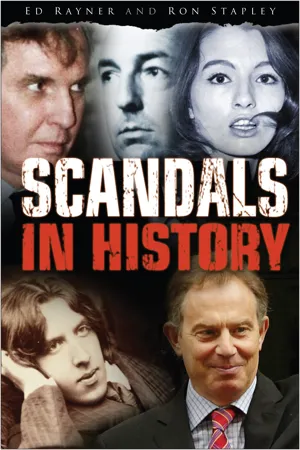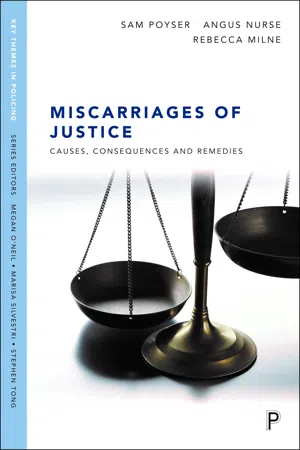History
Derek Bentley Case
The Derek Bentley case refers to the controversial trial and execution of Derek Bentley in 1953 in the United Kingdom. Bentley was convicted of murder for his involvement in a burglary where a police officer was killed, despite not having fired the fatal shot. His case raised significant public outcry and ultimately led to changes in the UK's capital punishment laws.
Written by Perlego with AI-assistance
Related key terms
2 Key excerpts on "Derek Bentley Case"
- eBook - ePub
- Ed Rayner, Ron Stapley(Authors)
- 2008(Publication Date)
- The History Press(Publisher)
SCANDALS INVOLVING MURDER AND VIOLENCEThe scandalous execution of Derek BentleyIn January 1953, Derek Bentley, a London youth, an epileptic with a mental age of eleven, was hanged for the shooting of a policeman in a botched attempt to break in through the roof of a confectionery warehouse in Croydon the previous November. This was a murder he did not commit. The gun was carried, and fired, by Christopher Craig, a friend of Bentley’s, who had persuaded him to try to burgle the warehouse that night. Police evidence told very heavily against both youths: Craig for firing several shots, the most fatal of which struck PC Stanley Miles in the forehead and killed him; Bentley for shouting encouragement to shoot, even though he was under arrest at the time. In 1952, the sentence for murder was death, and was mandatory. Unsurprisingly, Craig was found guilty, and was sentenced; Bentley, furthermore, on the strength of the judge’s recommendation that they should convict if they believed that he had ‘encouraged’ Craig, found him as an accomplice equally guilty for the deed. Christopher Craig, however, was only sixteen, and was too young for the death penalty; he was detained ‘at Her Majesty’s pleasure’, and in fact served ten years before his release. Derek Bentley, on the other hand, was nineteen and not covered by the underage proviso, and so, in spite of the jury’s recommendation for mercy, was sentenced to death. There were successive appeals, but these all failed, and Bentley was hanged. It was the only time in British criminal history that an accomplice was executed when the person directly responsible for the crime was allowed to live.Derek Bentley was born in Blackfriars Road, Central London, in 1933. It was a difficult twin birth, and his younger twin died shortly afterwards. It was discovered that the elder twin was suffering from acute pneumonia, and in an age before antibiotics he was only saved by blood transfusions from his father. The family was working-class, and moved from one house to another in Central London, with the father working for a pharmacist as a pill-maker, then setting up his own little café nearby under the railway arches, and finally retraining as an electrician. Though poor and ignorant, they all considered themselves respectable and staunchly voted Conservative. Derek proved to be something of a mummy’s boy, hated school and never learnt to read or write properly. From the age of five he began to have epileptic fits, often preceded by blinding headaches and vomiting. During the war he managed to avoid evacuation, and the family somehow struggled through the worst of the Blitz. After a brief spell ‘in the country’, as it seemed to them, that is in Edgware, in North London, in 1942, they went back to Hillingdon Street in Blackfriars during the V1 (‘doodlebug’) attacks and the attacks of the V2 rockets. During this renewal of the Blitz, the father worked in uniform full-time as an air raid warden in the ARP. They often slept on the platform at the Leicester Square tube station. At the end of the war, when Derek was twelve, the family went to live in Fairview Road, Norbury, midway between Streatham and Croydon and twelve miles from Central London. - eBook - ePub
Miscarriages of Justice
Causes, Consequences and Remedies
- Poyser, Sam, Nurse, Angus(Authors)
- 2018(Publication Date)
- Policy Press(Publisher)
The Northern Echo newspaper and the formation of the ‘Timothy Evans Committee’, calling for a public inquiry and free pardon for Evans (Kennedy, 1961). The subsequent Brabin Inquiry in 1966 concluded that Evans had murdered his wife, but that Christie had murdered Geraldine, a theory with little foundation (Woffinden, 1987: 27). However, importantly, it added that no jury could have convicted Evans if all the evidence now available had been presented at trial. On 18 October 1966, Evans was granted a free pardon. Although the CJS had survived the public criticism, it had almost certainly hanged an innocent man, and the public knew it.Derek Bentley
A case that had similar public impact during this period was that of Derek Bentley. Bentley was hanged for murdering a policeman in January 1953, having been convicted under the law of joint enterprise (Hostettler, 2009). The decision to hang Bentley, when he was indisputably not directly guilty of any violence, had no weapon and was under arrest when the murder occurred, was what engaged public opinion. Additionally, 19-year-old Bentley had a mental age of around 11 (a fact not disclosed to the jury) (Paris, 1991).In November 1952, Bentley and his co-defendant, Christopher Craig (aged 16), were interrupted in their attempt to rob a Croydon warehouse by police officers. Bentley was swiftly arrested; however, Craig produced a gun and shot and killed PC Sidney Miles. Other officers alleged that Bentley had urged Craig to shoot, saying ‘Let him have it’; however, he denied knowledge of Craig having a gun and both boys denied that this had been said (Eddleston, 2009). At trial, Bentley and Craig were found guilty of murder. Craig, too young to be sentenced to death, was sentenced to be detained at His Majesty’s pleasure. Bentley was sentenced to death. The Home Secretary, Sir David Maxwell Fyfe, refused to advise a reprieve despite massive public support for Bentley, expressed through petitions submitted to the Home Office and a demonstration outside the Houses of Parliament (Koestler, 1956).Years later, Constable Pain, an officer at the scene of the crime, whose testimony was not used in court, stated that Bentley had never said ‘Let him have it’ (Hobbs, 1997), and after years of campaigning by his sister, Bentley’s conviction was quashed on 30 July 1998 (Mills, 1992). It was ruled that the trial judge had failed to adequately put Bentley’s defence before the jury in his summing up, most particularly, that he had not directed them to consider whether since Bentley was under arrest at the time of the murder, this affected his responsibility for it. These were the same grounds (phrased slightly differently) as those presented at Bentley’s original appeal in 1953 (Eddleston, 2009: 144).
Learn about this page
Index pages curate the most relevant extracts from our library of academic textbooks. They’ve been created using an in-house natural language model (NLM), each adding context and meaning to key research topics.

